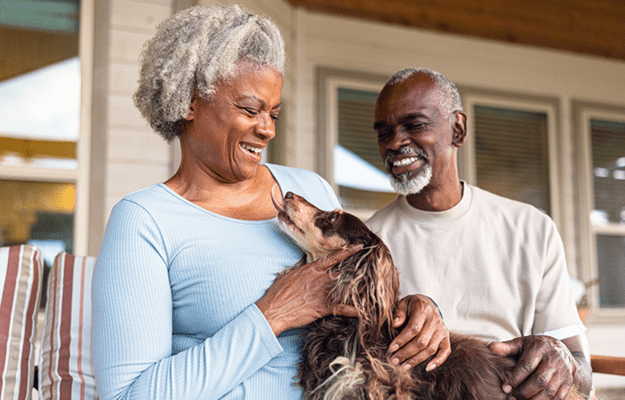
Safe Housing for Domestic Violence Survivors Is More Than Shelter
by Peg Hacskaylo, District Alliance for Safe Housing; Suzanne Marcus, District Alliance for Safe Housing; Anne Menard, National Resource Center on Domestic Violence; and Cris Sullivan, PhD, Michigan State University, Research Consortium on Gender Based Violence
“Why doesn’t she just leave?” is still a common question when talking about survivors of domestic violence. But it not only presumes that leaving the relationship will end the violence (it often only makes it worse), it also wrongly implies there is always a safe place for a victim to go—a place that will hide them and where they can find support and comfort from crisis for long enough to recover and move on.
Being a victim of domestic violence is a leading cause of homelessness, and survivors of domestic violence are four times more likely to experience housing instability than those who have not experienced abuse. Survivors of domestic violence also suffer from physical and mental health consequences, as well as a loss of social networks, that might remain prevalent after the abuse stops and can make it difficult to obtain and sustain employment, adversely affecting their ability to find and keep permanent housing.
Though emergency shelters were developed as a core option for domestic violence victims with no place else to find safety, shelter beds are not always available—or the best option—for every survivor. And once survivors access shelter, they might face barriers to securing permanent affordable housing. A study of residents in domestic violence shelters nationwide found that 84 percent of survivors needed help finding affordable housing.
The domestic and sexual violence advocacy movement has spearheaded housing programs that reduce social isolation and maintain housing and family stability, while addressing survivors’ safe-housing needs.
Giving survivors what they need: Reducing financial barriers
The District Alliance for Safe Housing (DASH) in Washington, DC, piloted its Survivor Resilience Fund (SRF) through an innovative public-private partnership in 2014. The flexible funding program, which is grounded in the principles of survivor self-determination and trauma-informed care, helps survivors achieve housing stability and avoid homelessness through emergency financial assistance.
SRF reduces paperwork, restrictions, and other barriers for survivors to access flexible funding and other DASH services. DASH advocates offer survivor-driven housing advocacy and safety planning before, during, and after an SRF grant is made with joint survivor-advocate decisionmaking about the grant parameters. There is no cap on the grant amount; grants are administered within 48 hours once the determination is made; and there are few conditions on what the grants can cover. Although most grants are made for housing expenses such as back rent and security deposits, funds can be used for other expenses which, if not paid, could pose a threat to a survivors’ housing stability.
Evaluation findings indicate that 94 percent of clients who received SRF grants remained safely housed six months after receiving funding. Grants ranged from $275 to $8,508 (the average was $2,078) for such expenses as rent, moving costs, and utilities, as well as for expenses not often covered by traditional assistance programs, such as car repair, child care, and out-of-state travel to court for custody.
Clients overwhelmingly reported life improvement after receiving the funds (100 percent) and increased hopefulness about the future (90 percent). Further, they reported satisfaction with the fast, low-barrier, and nonjudgmental service delivery model. Evaluation results suggest that successful outcomes can be achieved without traditional crisis intervention and shelter services at least for survivors whose needs can be met outside these systems.
Giving survivors what they need: Housing First
The Washington State Coalition against Domestic Violence experimented with adapting the Housing First model, originally developed to reduce chronic homelessness, for domestic violence survivors. The Domestic Violence Housing First (DVHF) project supports survivors in rapidly accessing safe, stable housing while providing advocacy and support to rebuild their lives free from abuse. The model is predicated on the principle of housing as a right, as opposed to the notion that survivors should demonstrate housing readiness before obtaining permanent housing.
The DVHF model includes three key components: (1) survivor-informed, trauma-informed, mobile advocacy; (2) flexible funding; and (3) community engagement. Survivors and advocates address survivor-identified needs. Mobile advocacy services are provided in locations that are safe and convenient for survivors. Individualized flexible funding is used to support housing access and stability and is not limited to rent or onetime grants. Partnerships with housing providers, including landlords, increase housing access for survivors and supports broader systems change.
Evaluation data showed that, of survivors located over time, 96 percent receiving DVHF retained their housing at 18 months. Survivor focus group data revealed additional positive outcomes for families, including increased safety, improved health and well-being, and restored dignity.
These innovative programs offer survivors not just shelter, but the supports and flexibility to choose their own best path forward.
For more information about the Domestic Violence and Housing Technical Assistance Consortium and tools, resources, and research about the intersection of domestic and sexual violence, homelessness, and housing, go to www.SafeHousingPartnerships.org.
The National Alliance for Safe Housing (NASH) provides programs and communities the tools, strategies, and support necessary to improve coordination between domestic and sexual violence services and homeless and housing providers, so that survivors and their children can avoid homelessness as the only means of living free from abuse. NASH is a national technical assistance and training program of the District Alliance for Safe Housing. For more information, go to www.dashdc.org.


